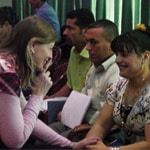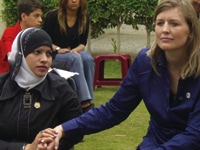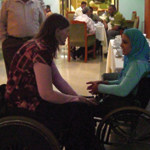

Has the struggling government of Iraq finally gotten its act together? As always, the answer is yes and no. However, for a positive example of how to successfully unite Sunnis, Shiites and Kurds, maybe the powers that be should look to the Iraqi disability community.
Under the leadership of Tiana Tozer, and with support from Mercy Corps and the World Institute on Disability, carefully chosen community education teams made up of Iraqis from disparate parts of the country are making progress in changing the country’s disability awareness level. We got a glimpse of that progress a few months ago when NBC Nightly News’ Brian Williams featured Tozer in a short news segment titled, “Making a Difference.”
Tozer was shown interacting with disabled Iraqis as part of Portland, Ore.-based Mercy Corps’ Community Action Program, but one thing the news segment didn’t show was the scope of the underlying problem facing Iraqis with disabilities prior to the war — a deeply entrenched cultural mindset that attaches shame and low expectations to just about any disabling condition.
“The number one issue in accessibility is not stairs or physical barriers, it’s people’s attitudes,” says Tozer. “There’s a shame of having a disability, or having a person with a disability in your family, particularly in more uneducated areas. There’s a sense that if your child has been born with a disability, then he’s been cursed by God. Some people with disabilities have never been outside the room they live in.”
Experience Creates Readiness
How did a Boise, Idaho, farm girl and former Paralympic basketball team member in both the 1992 and 1996 games end up directing a disability advocacy program for Mercy Corps in a global hotspot? Tozer’s broad experience has coalesced to prepare her for her current role. For one thing, she lived and studied in France for a year when she was only 15, so she’s no stranger to living in unfamiliar cultures and learning foreign languages.

When she was run over by a drunk driver at age 20, she began working to change DUI laws soon after her injury. Activism seemed a natural outgrowth of her circumstances. Her legs were so severely crushed that it took 34 operations in her first four years as a wheelchair user to be able to stand again. Today, she stands and walks limited distances but depends on a wheelchair most of the time.
At the time of her accident, Tozer, an imposing 6 feet 1 inch tall, was developing as a nondisabled basketball player. But she credits wheelchair basketball with having perfected her game, and more importantly, with rebuilding her self-esteem. As a graduate student at the University of Illinois, she not only participated in wheelchair sports, she also ran sports camps for kids, which prepared her for a later role running the national intercollegiate wheelchair basketball tournament, where she expanded and honed her management skills.
After studying romance languages and political science and earning degrees at the University of Oregon and the University of Illinois, she was ready for a career in international relations. “But what really got me excited about this type of work was when I went to Bosnia in 1997 to teach veterans of the war wheelchair basketball while raising awareness about land mines,” she says.
A decade later she was hired by Mercy Corps to run its disability program in Iraq. During the prior 10-year stretch, she settled in Portland, Ore., and took a job as a public relations specialist for Standard Insurance. Wheelchair basketball took a back seat to more practical considerations, like buying a condo and taking care of herself. “One of the first questions I always ask in a job interview is about benefits,” she says. “The need for health insurance has driven my life.”
As someone who has always been attracted to foreign cultures, in 2007 she found herself gravitating toward the Middle East. “Mercy Corps was hiring for a public information position in its disabilities program in Iraq. I was doing informational interviews to get to know everyone I could at MC, and I ended up being asked to be the program manager. That’s how it all started,” she says, “and now I get to helppeople — that’s what I do in my job.”
The Need for Advocacy
According to Mercy Corps, there are an estimated 2 million people with disabilities living in Iraq, and 90 percent live below the poverty level. Besides being isolated by a cultural mindset that attaches pity and shame to disability, Iraqis with disabilities are not expected to be active, contributing members of society. Toss in an infrastructure that lacks even basic accessibility, large-scale destruction from war, and a fledgling government overwhelmed by emergency issues, and it’s no wonder that disability awareness and issues are a low priority. However, the flip side is hopeful: What better time to advocate for physical and attitudinal inclusiveness than during the rebuilding process? “With reconstruction going forward,” says Tozer, “now is the time to say, ‘Hey, while you’re rebuilding that building, why not make it accessible?'”

But Mercy Corps recognizes that the need for inclusiveness goes much deeper than physical accessibility. That’s why its disability program revolves around raising awareness. To change the predominant cultural mindset, Tozer has been instrumental in forming, training and directing community education teams made up of Iraqis with disabilities. Four CE teams, each with seven members, have been formed from the four governorates of Iraq — Amarah, Basra, Diwaniyah, and Kut — along with one team from autonomous Kurdistan, for a total of 35 team members. Each team has been busy making presentations to school children, teachers, local and national government representatives, and community leaders.
In Diwaniyah during July, for example, the CE team from that governorate met with Shaheed al-Jabri, their representative from Parliament. Tozer’s monthly report summarizes what happened at the meeting: “Haider talked about ramps and accessibility and pointed out that now is the time to be thinking about accessibility because Diwaniyah is under construction. Motaz addressed the issue of accessible education and the fact that not only are universities not accessible, but people with disabilities are not allowed to become teachers in Iraq. Bassem talked about the poor hospital conditions and lack of rehabilitation facilities, and Dhyaa talked about the need for vocational training for the deaf so that they are employable after high school. Haider addressed the need for support for disability sports. Zainab talked about the need for jobs and pointed out that many people with disabilities who have college degrees are not being employed.”
Sound familiar? In the United States we are fortunate to have the Americans with Disabilities Act and growing cultural awareness, but Tozer is quick to point out that the 70 percent unemployment rate in our own backyard is still a major problem. Perhaps we’re not that much different from the Iraqis.
The consensus of the Diwaniyah CE team was that al-Jabri was responsive. When he found out that one of the team members, Zainab, was unemployed, he promised her an administrative job with the Department of Education. He also assured the team that he would raise their concerns about being under-represented on the newly forming National Disability Committee. “They’re going to create a ministry for people with disabilities, with 20 people on the committee, but there are only six slots for people with disabilities on the committee,” says Tozer. “And they won’t even allow deaf people to be on the committee. I’m pretty much up in arms about this. Only people with disabilities can determine their needs, and six out of 20 just doesn’t make sense.”
An outdated, persistent strain of paternalism lies at the root of the problem. “There is still this attitude that we need to carefor people with disabilities,” says Tozer, “when what is needed is to teach them how to care for themselves and how to advocate to get what they need.”
Young Iraqis Lead the Way
While the obstacles to inclusiveness are formidable, encouraging stories abound. The CE teams are active and involved in rebuilding their nation, and Tozer is pleased with the commitment of the individual team members. Each team member is paid a stipend, but the amount is minimal, not enough to account for their obvious enthusiasm. “These people are motivated,” she says. “They want a better life for themselves. Moving forward, we’re only not renewing contracts with three people out of 35.”

The process of finding and training team members to become advocates is both well-planned and serendipitous. Tozer set out to find young, educated Iraqis with disabilities, and to intentionally include a least two women on each team. “You have to find people who are motivated to be advocates. A person with a disability in Iraq who has taken the time and effort to get an education is motivated.” So she sent some of her Mercy Corps employees, all of whom are Iraqis, to scout for CE team members at local universities.
But not all team members are educated in the conventional way. Abbas, for example, was a political prisoner in Sadam Hussein’s regime because he spoke out for free elections. He believed his people should be able to choose their president. “From 2000-2003, during the time that Abbas was in prison, some people were tortured and some were killed,” says Tozer. “Abbas was released during the American invasion and wasn’t disabled at the time. But later, when al-Sistani called for people to enter Najaf, a Muqtada al-Sadr stronghold, there was fighting, and Abbas was paralyzed by a gunshot wound.”
During training for the CE teams, Abbas emerged as a catalyst for change. “Everyone would be complaining that they were so tired and needed a break,” says Tozer, “and Abbas would say, ‘Look, we only have so much time to get this information, we need to push on.’ He gets democracy, and I think the younger people get it more. They understand about reaching out to their peers and training their peers about what their rights are. They understand about mobilization, and they understand that they have to lead by example.”
Beha, another young CE team member, lost his arm in an explosion. One of his sisters lost both legs, and two other sisters were killed, all in the same explosion. “One of the tricks the enemy uses is to launch a bomb and it doesn’t explode,” says Tozer. “Everyone comes to check it out after it seems safe. Then 15 minutes later they send another bomb so they can kill more people. That’s what happened to Beha and his family.”
Tozer goes on to tell the story of how Beha was having trouble coming to terms with his disability. One night he went to dinner with Tozer and another person. “l told him there were a lot of people worse off than I am, and it helps to have a sense of humor about your disability. Like, for example, what’s the best thing about having only one arm? It takes less energy to clap.” After a few more jokes, Beha began to loosen up. A change in his attitude eventually followed. Later on, he was chosen to attend a conference on war and disability in Lebanon. Now he’ll be presenting at the next advocacy training. “I think that sort of opened his eyes that there are certain opportunities that are open to him that aren’t open to others because he has a disability.”
One of Tozer’s Mercy Corps employees, Ali, also breaks the mold. He’s about 30, she says, uneducated, and one of the poorest English speakers. “But,” she says, “he’s highly motivated, and he works hard. I think his father was very community oriented. I had a very interesting conversation with Ali at a time when I was having a standoff with the Department of Education. And I said to him, ‘Doesn’t it bother you that some of your government officials are so self-serving?’ And Ali said to me, ‘Tiana, everything in Iraq bothers me.'”
Ali, it turns out, is also an excellent judge of character. One day as he was driving to work on his usual route, he passed by a young man in a wheelchair who was tending his garden. He had seen this man, Haider, a number of times, but this time he stopped and asked him if he would be interested in joining a CE team. It turns out Haider is as passionate about disability advocacy as he is about growing vegetables.
“Two of my CE teams are really innovative and motivated and moving forward, and two are a little slower,” says Tozer, “but that was to be expected. And then there’s the Kurdish team, which is just phenomenal.”
Bridging the Ethnicity Gap
One of the main reasons for the success of the Kurdish CE team is their mentor, Sheik Noori, who was injured in a car crash when he was younger. “He’s an older man, a wheelchair user, and he runs Rozh Society for the Disabled in Kurdistan. He speaks Kurdish, Arabic and English,” says Tozer. “He’s also the deputy chairman of the Iraqi Alliance for Disability Organizations. He’s a hard worker, understands democratic principles, has incredible integrity and has worked hard for people with disabilities in Kurdistan. He understands what it means to put pressure on government as a common citizen.”

Another influential person in Iraq’s growing disability awareness movement is an American, Bruce Curtis, of Berkeley, Calif. “When I got to Iraq, we were issuing small grants to disability organizations to try and build their capacity. And it wasn’t working very well,” says Tozer. “So I started wondering, how are we going to develop this program in a way that is sustainable and really makes a difference? I started talking to Bruce about this training he had done in Russia. And I was fascinated, because it sounded exactly like what we were trying to accomplish. So he worked with me. We spent a ton of time talking on the phone to develop this training.” As a result, with the help of WID, trainers came from Perspectiva (a Russian disability organization) to Iraq for advocacy training — one came from England, one came from Moscow, and Bruce Curtis came from Berkeley.
Curtis is also involved in providing adaptive equipment. “Bruce and I started talking about Whirlwind Wheelchair International,” says Tozer. “He’s the one who contacted Mercy Corps on behalf of an Iraqi-American doctor in San Francisco who’s donating Whirlwind wheelchairs to Iraq. The doctor wanted to help the community where his family was, but they needed help in getting the wheelchairs into Iraq, and that’s where Mercy Corps stepped in. The wheelchairs will be shipped straight to Kuwait and trucked into Iraq. Some of my people will identify beneficiaries — taking pictures and gathering information for the distribution process. About three months later we’ll go back and see how the chairs are working for them. Almost anything would be better than the chairs they are currently using.”
But Tozer makes it clear that the main focus needs to be on advocacy and awareness, not equipment. “Iraq’s going to have a lot of money one day,” she says, “and Iraqis with disabilities need to know how to get their share of that.”
Capacity building and sustainability are her goals: “We can keep running groups through our advocacy program, and perhaps the next time one of the former community education team members will become a mentor. It’s designed to build the capacity of the organizations we have the mentors with, and to build self-esteem among young people with disabilities who go through the program.”
She also plans to utilize contacts and friendships she has made through the years. “I want to partner with the University of Illinois, my old alma mater, and one of my buddies, Mike Frogley, who coaches the Canadian men’s basketball team, to institute a sports camp. The idea is to teach coaches and trainers and people within Iraq to do these camps themselves. Sports is a great vehicle for integration and self-esteem building and independence.”
And she should know. After all, that’s the path her life has taken, and she’s determined to capitalize on it. In a Sept. 25 radio broadcast on Oregon Public Broadcasting, Tozer, back in the United States for a well-deserved rest and some fundraising, announced, “We just had 24 basketball wheelchairs, top of the line, shipped to Iraq. We have 24 more coming. Next year I hope to put on a tournament in Iraq.”
Just as she did in war-torn Bosnia in 1997, Tozer will teach Iraqi wheelchair users how to play wheelchair basketball. A tournament will go a long way toward replacing the old cultural mindset of shame and low expectations with pride and achievement, and that’s half the battle with any advocacy program.
“I feel that I’m really seeing the change of attitudes and the progress with my young CE teams. People with disabilities can be an example for the rest of Iraq because they have come together across the ethnic divisions. It doesn’t matter if you’re Sunni, Shia or Kurdish, male or female, people with disabilities recognize that they need to work together to achieve a better Iraq for themselves. There is hope for Iraq,” says Tozer, “and it lies with the next generation.”
Support New MobilityWait! Before you wander off to other parts of the internet, please consider supporting New Mobility. For more than three decades, New Mobility has published groundbreaking content for active wheelchair users. We share practical advice from wheelchair users across the country, review life-changing technology and demand equity in healthcare, travel and all facets of life. But none of this is cheap, easy or profitable. Your support helps us give wheelchair users the resources to build a fulfilling life. |


Recent Comments
Bill on LapStacker Relaunches Wheelchair Carrying System
Phillip Gossett on Functional Fitness: How To Make Your Transfers Easier
Kevin Hoy on TiLite Releases Its First Carbon Fiber Wheelchair